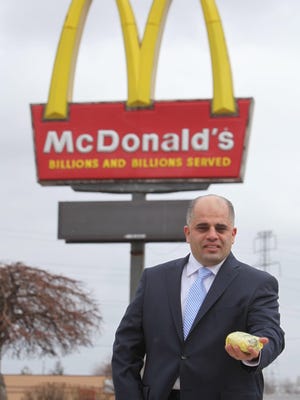Did This Happen at a Mcdonalds in Detroit Michigan Now Serving Aii Halal Beef
- Lawsuit against McDonald%27s for selling meat advertised as halal was reached Jan. 7
- Halal for Muslims is the equivalent of Jewish kosher
- Judge will hear challenges to the settlement on Feb. 8

DETROIT -- Some Muslims in metro Detroit are challenging how money will be divided from a tentative $700,000 settlement over complaints that
McDonald's sold non-halal chicken advertised as halal
at a Dearborn, Mich., location.
The settlement, reached last month between McDonald's and two organizations, calls for about $275,000 to go the Huda Clinic, a Muslim health center in Detroit; $150,000 to go to the Arab American National Museum in Dearborn, and $25,000 to go to a Dearborn Heights man who was the lead plaintiff. The remainder mostly would go to attorney fees.
Critics say the money should go instead to individuals who believe they ate non-halal McChicken sandwiches and McNuggets thinking they were halal, the Islamic equivalent of Jewish kosher.
"It should go to the people who were lied to, who were affected by it," said Hanadi Kesserouani, 23, of Dearborn. "Why should it go to groups that had nothing to do with this? We were the ones who were affected, not them."
Halal is the word for things that are sanctioned by Islamic law. It is often used to describe foods Muslims are allowed to eat. Halal meat, for example, must not include any pork products because Islam considers pigs to be unclean. Also, the meat must be slaughtered in a certain way: A Muslim must recite a prayer while the animal is bleeding.
Attorney Majed Moughni of Dearborn filed a complaint Jan. 25 in Wayne County Circuit Court, asking that the Jan. 7 settlement be set aside, or that people who might have been injured be given more time to challenge it. The case is to be heard Friday before Judge Kathleen MacDonald, who oversaw the settlement.
Moughni called the settlement a backroom deal meant to enrich two organizations and attorneys at the expense of people who mistakenly ate non-halal meat. "It's a slap in the face of the community," he said.
The dispute illustrates the growing popularity of halal products in metro Detroit as its Muslim population grows. And it shows how seriously some take halal, which requires that meat and other products be prepared according to Islamic law. Islam forbids consumption of pork, and God's name must be invoked before an animal providing meat for consumption is slaughtered.
There are only two McDonald's in Michigan -- and possibly in the U.S. -- that serve halal chicken sandwiches or McNuggets. Both are in Dearborn, which has the highest concentration of Arab Americans in the country. McDonald's started selling halal chicken products at its location on Ford Road in east Dearborn in 2000.
There are also halal products sold at some KFC, Subway and Big Boy restaurants in Dearborn and Detroit.
The settlement was reached after a lawsuit was filed in 2011, accusing McDonald's of selling non-halal products billed as halal. It deals with two McDonald's restaurants: the one on Ford Road and one on Michigan Avenue. The Michigan Avenue location is not accused of mistakenly selling non-halal products advertised as halal, but was included in the settlement because it sells halal products.
The settlement says that McDonald's and Finley's Management, which runs the Ford Road location, can't be sued in the future over the selling of non-halal products advertised as halal.
Finley's Management referred questions to McDonald's, which in a statement denied "any wrongdoing."
In the statement, McDonald's said it settled because "all parties involved concluded that the best resolution of this matter was to provide support to organizations that also serve and benefit the local community."
It said that the museum and Huda Clinic were selected to receive money "because of their service to the community."
But Moughni said the museum is a secular institution that is not connected to Islam and so shouldn't be part of the settlement. And, he said, the Huda Clinic, which is rooted in a Detroit mosque, is not in Dearborn or Dearborn Heights, whose residents are most likely to have frequented the McDonald's on Ford Road.
After hearing about the settlement last month, Moughni posted his criticisms on Facebook. He said he has drawn more than 1,300 supporters who agree that the settlement was improper.
The agreement gives people who think they were affected until Feb. 15 to opt out of the settlement. To make Muslims who might have been affected aware of the settlement, notices are being put up at several mosques and at the two restaurants.
Moughni said people need more time to get a chance to opt out.
Mike Jaafar, one of the attorneys who settled with McDonald's, said: "We understand the criticisms that some may be leveling at the settlement." But he said it would have been difficult for individuals to document that they bought non-halal products unknowingly.
The Jan. 7 settlement said it would be "economically impractical and perhaps impossible" to give payments to individuals affected by the eating of non-halal products.
Source: https://www.usatoday.com/story/news/nation/2013/02/04/mcdonalds-halal-settlement-muslims/1889973/
0 Response to "Did This Happen at a Mcdonalds in Detroit Michigan Now Serving Aii Halal Beef"
Post a Comment